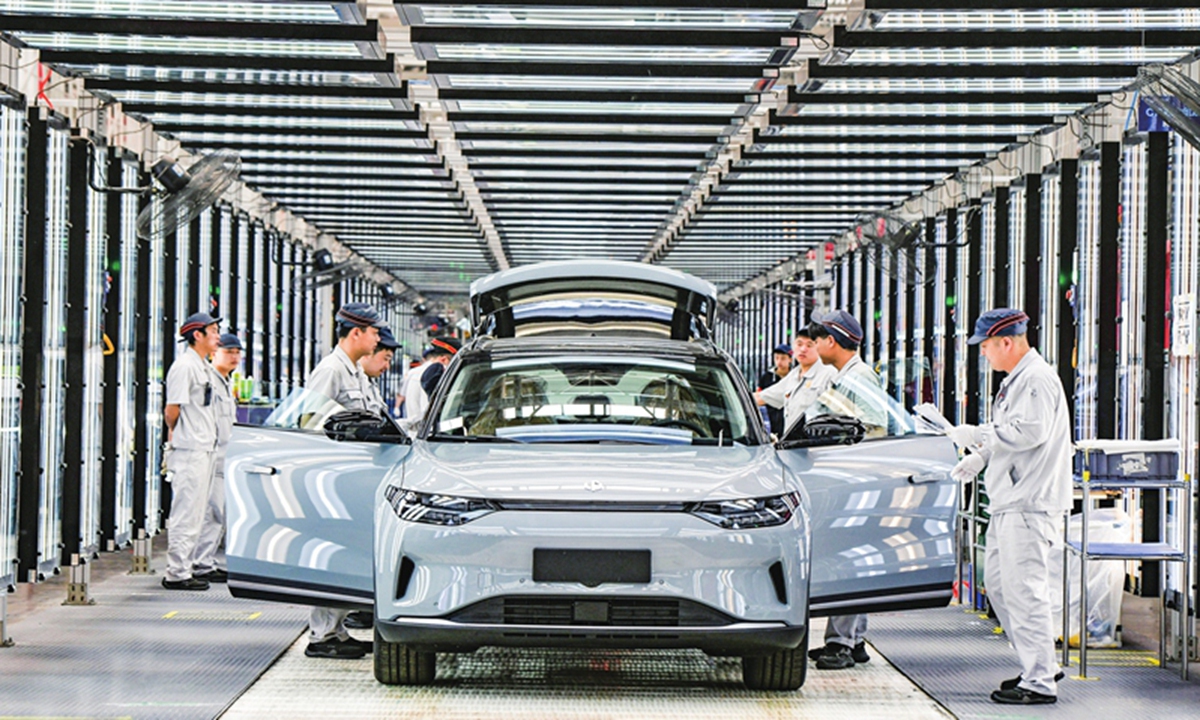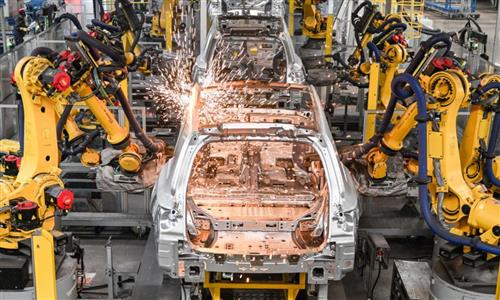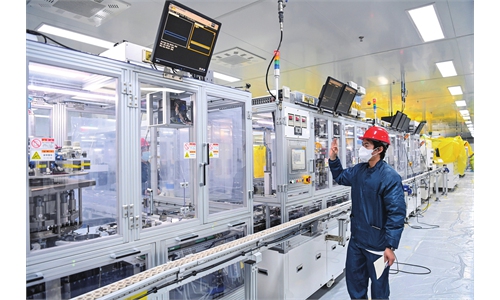Selfish US move of forcing allies to jointly respond to China’s ‘overcapacity’ set to harm EU’s tech development: experts

Workers complete assembling an electric vehicle (EV) at China's EV start-up Leapmotor in Jinhua, East China's Zhejiang Province on April 1, 2024. The smart EV factory delivered 14,567 new vehicles in March, a yearly increase of 136 percent. Photo: VCG
The US is advancing its moves to contain China's new-energy sector, as US Treasury Secretary Janet Yellen is reportedly pushing G7 countries to jointly respond to so-called industrial overcapacity in China.
However, Chinese observers said that the EU is unlikely to bend to Washington's pressure, as there is great potential for China and the EU to deepen cooperation in a variety of sectors.
They said that the selfish US move to force its allies to crack down on China's new-energy products will have a negative impact on their technological development and the growth of international competitiveness, while disrupting global industrial and supply chains and hindering the global green transition.
The remarks came as Yellen said that the US and Europe need to respond to China's industrial "overcapacity" in a "strategic and united way," Reuters reported on Tuesday.
Yellen claimed that G7 finance ministers shared US concerns about Chinese efforts to dominate the clean-energy industries, but did not need "detailed coordination" on trade actions following the imposition of steep US tariffs on Chinese goods, according to the Reuters report.
The US "overcapacity" narrative against China's new-energy sector is diametrically opposed to facts and the laws of economics, Chinese Foreign Ministry spokesperson Wang Wenbin said on Wednesday.
The US can't just wave the banner of climate response and ask China to take on greater responsibility on the one hand, while wielding the stick of protectionism and not letting Chinese green products benefit the world on the other, Wang said.
China stands ready to work with all countries to deepen cooperation on new-energy industrial and supply chains, and promote tech innovation and industrial development, Wang said.
Analysts said that the US is attempting to court Western countries to crack down on China's new-energy industry, and they warned that the move will harm global industrial and supply chains while hindering the global green transition.
China will take forceful action if the US harms the legitimate rights and interests of Chinese companies, they said.
"The US believes confronting China alone is too costly and thus it seeks to enlist its allies to share the burden. However, this self-serving strategy could harm the technological development and competitiveness of its allies by blocking opportunities from China," Liu Weidong, a research fellow at the Institute of American Studies at the Chinese Academy of Social Sciences, told the Global Times on Wednesday.
Liu said the US move of urgently seeking to rally G7 members to contain China's new-energy sector shows that the US is deeply concerned that it has fallen behind China in certain key sectors.
He Weiwen, a senior fellow from the Center for China and Globalization, told the Global Times on Wednesday that G7 countries are unlikely to bend to the US pressure, as the G7 framework does not have any legally binding force.
"There is great potential for China-EU cooperation. Moreover, companies from the two sides may directly carry out cooperation disregarding government policies," He said.
He said that the US actions against China's new-energy sector lack justification, especially considering that the US provides subsidies to its own new-energy industries. Confrontation and argument are not effective ways to solve problems. With the world economy still in the recovery phase, it is hoped that both sides can address each other's concerns in a fair and mutually beneficial manner so as to achieve a more favorable trade arrangement, He said.
China's development of new-energy products and its industrial cooperation with other countries are bringing tangible benefits to many international capitals and providing great development opportunities for other countries.
To further accelerate the green transition in China's auto industry, Liu Bin, chief expert of the China Automotive Technology and Research Center and deputy director of the China Automotive Strategy and Policy Research Center, who has participated in drafting policies for China's auto industry, has called for raising the temporary import tariff rate on cars with large engines.
Liu told the Global Times in an exclusive interview reported on Tuesday that according to WTO rules, China's temporary tariff rate on imported vehicles could be raised to a maximum of 25 percent, and any decision by China to hike the rate would be in line with WTO rules and fundamentally different from the protectionist moves taken by certain countries and regions.
As top US economic officials have pledged to take steps to improve the business climate for American and Chinese companies, and have stated that the US wants to have a healthy economic relationship with China, it is important for the US government to align its actions with its words. Intensifying restrictions and creating a false narrative like "overcapacity" is damaging to both economies and destabilizing for the world economy, Huo Jianguo, a vice chairman of the China Society for World Trade Organization Studies in Beijing, told the Global Times on Wednesday.


